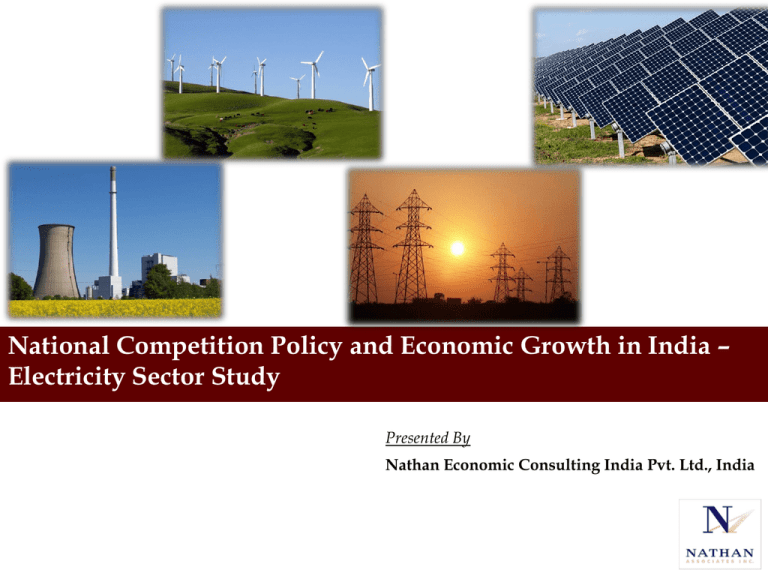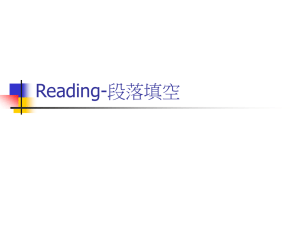National Competition Policy and Economic Growth in India – Presented By
advertisement

National Competition Policy and Economic Growth in India – Electricity Sector Study Presented By Nathan Economic Consulting India Pvt. Ltd., India Based on the objectives of competition principles and the National Competition Policy To look into the state of competition in the Indian electricity sector To evaluate if the existing policies, laws and regulations are in line with the proposed National Competition Policy To assess economic benefits of opening up the sector to private participation To look into political economy constraints of implementing competition principles in the sector To recommend steps which will encourage competition in the sector NATHAN INDIA Objective of the Study Proposed by the Ministry of Corporate Affairs (MCA) in 2011, the overarching policy still has to be adopted by the government Aimed at introducing competition principles and regulations to promote a competitive market structure in order to maximise overall social welfare Check anticompetitive outcomes of government policies, rules and regulations Address areas such as transparency, accountability, fair pricing and competitive neutrality Recommend national and regional co-operation in competition policy enforcement NATHAN INDIA Basic Tenets of the National Competition Policy (NCP) Focused around assessing distortions in the market, their effects, and remedial actions and suggestions. In particular, the study identifies and analyzes: Distortions in the electricity sector that limit competition, including government monopoly on coal Regulatory hurdles and their effects on the sector’s competitiveness Misinterpretation of certain regulations to suit political expediency Economic benefits of competition Best practice case studies Corrective steps to make the sector more competitive NATHAN INDIA Scope of the Study The study has evaluated restructuring process of the power sector: Roles of the Central Electricity Regulatory Commission, and the State Electricity Regulatory Commissions in exercising independence in tariff setting Unbundling of State Electricity Boards (SEBs) into companies to perform generation, transmission and distribution functions Independence of utilities such as load despatch centres Introduction of competition in generation, distribution and transmission besides introduction of trading in power Open access in transmission and distribution NATHAN INDIA Assessment of Restructuring of the Power Sector Competition in any sector is generally associated with the following: Lower prices for consumers with better choices Increased number of suppliers Improved efficiency Innovation NATHAN INDIA Benefits of Competition Evaluation of benefits using competition toolkits of OECD and CUTS International Fair pricing of tariffs Currently tariffs are regulated more through state governments’ intervention Agricultural and rural sectors are highly subsidized Private players are disincentivised due to low returns Level playing field between competitors Government monopoly over coal distorts level playing field between state and private players Fuel Supply Agreements between Coal India and beneficiaries has come under the CCI’s lens Entry Barriers Lack of open access in retail distribution: For example, in Delhi, despite two private discoms being present, customers don’t have open access choice Promote monopolies and their abuse Lack of a separate carriage and content model NATHAN INDIA Benefits of Competition : A Toolkit Approach Data analyses show direct benefit of competition Between 2006-07 and 2010-11, there was an increase in the share of private players in total installed capacity in generation This is largely because the Electricity Act, 2003 liberalized the generation sector through a licensefree regime. The total installed capacity of India increased from 132,327 megawatts (MW) in 2006-07 to 2,25,793MW as on 30th June, 2013 NATHAN INDIA Benefits of Competition in Generation Open Access Case Study – Navi Mumbai (2011-12) 2 private players - Reliance Infrastructure (RInfra) and Tata Power (TPC). Tariff rates – Rs. 5.2 per unit and Rs. 7.06 per unit by TPC and RInfra respectively. Maharashtra Electricity Regulatory Commission (MERC) allowed consumers to migrate. Controversy arose due to surging migration of consumers to TPC - Rinfra moved MERC MERC issued an order to allow changeover in Mumbai for a particular set of consumers (those consuming less than 300 units a month), thus putting a cap on Open Access TPC termed this MERC order as a decision against competition Solar bids Good example of how competitive bidding can benefit consumers through lowered power tariff rates Competitive bidding in solar energy under the National Solar Mission in 2011 brought down the price at which solar energy can be consumed. The lowest bid at Rs. 7.49 per unit was 50% lower than the benchmark tariff of Rs. 15.39 per unit as set by the CERC NATHAN INDIA Case Studies Maharashtra (2005) Before unbundling, a shortfall of over 4,000 MW of power - demand side management Reduction in transmission and distribution losses from 35% in 2004-05 to 32% in 2005-2006 Rise in revenue collection from consumers by 15 percent between 2004-05 and 2005-06 Average tariff for agriculture in 2012 was 215 paise/kwh Maharashtra state discom given a rating of ‘A’ by ICRA/CARE; 74 private entities Savings on account of controlling power theft rose from Rs 19 crore in 2004-05 to Rs 40 crore by December 2005 Gujarat (2005) Net Loss of Rs. 2,246 crore (2000-01) turned into net profit of Rs. 533 crore (2010-11) Reduction of transmission and distribution losses from 35% to 20% between 2000-01 and 2010-11 Average tariff for agriculture in 2012 was 176 paise/kwh. State discoms rated ‘A+’ by ICRA/CARE, 25 power entities Gujarat separated feeder lines to rural areas under Jyoti Gram Yojana Scheme NATHAN INDIA Benefits of Early Unbundling: Case Studies The below mentioned data from the ministry of power, the Planning Commission and CERC reflect that unbundling and corporatization have helped Maharashtra and Gujarat The ICRA/CARE rating methodology has focused on efforts made by respective discoms in improving their operational efficiencies and financial performance Between 2008-09 and 2011-12 power deficit fell for Gujarat and Maharashtra and rose for Bihar and Tamil Nadu Parameters Unbundling/Restructuring Year Commercial Profit / Loss with Subsidy (INR Crore) (2012) * Gujarat Maharashtra Tamil Nadu Bihar 2005 2005 2010 2012 642 150 (8,144) (1,788) (458) 150 (10,426) (2,868) Unit Cost of Power Supply (Paise per Kwh) 427 480 514 775 Average Tariff for Sale of Electricity (Paise per Kwh) 398 466 353 374 13 3 9 0 -7% -3% Commercial Profit / Loss without Subsidy (INR Crore) (2012) * Share of Revenue from Agriculture in Total Sales Revenue (Percentage) (2012) Difference Between Cost of Power Supply and Average Electricity Tariff -31% -52% Sources: Ministry of Power, Central Electricity Authority, Planning Commission Report: Annual report 2011-12 on the working of state power utilities and electricity departments. * Represent Annual Plan figures for 2011-12. NATHAN INDIA Data Analysis across Various Parameters Tamil Nadu started unbundling only in 2010 and the tariffs have been revised since then The state needs to have a vibrant electricity sector as it is an economically developed state It ranks 4th in the country in GSDP, has sound agriculture, industrial, export and infrastructure sectors It can sustain growth and also higher electricity tariffs With FDI inflows of $8 billion between 2000-12, it is amongst the highest FDI attracting states IT exports growing at 26.5% With effective power sector reforms, distribution losses can be wiped off soon With right policies, Tamil Nadu will also be able to attract private players in generation NATHAN INDIA Tamil Nadu Electricity Sector can Improve Tata Power Company Due to open access 120,000 customers migrated to TPC in 2011-12. Rinfra First 100% privately owned inter-state transmission line Adani Power Ltd 430 km Mundra – Dehgam transmission line, the longest by a private player. Temporary hike in tariff in April 2013 for its UMPP, a positive role played by CERC. Lanco Infratech Ltd 7 sanctioned thermal power projects, thanks to licence free generation NATHAN INDIA Case Study: Private Players Nathan’s appraisal of sector as a whole: Pro competition changes have taken places since the enactment of the Electricity Act, 2003 - open access, unbundling of utilities, corporatization of distribution companies, removal of licences in generation, private sector participation in transmission and distribution However, benefits have had limited impact as provisions of the Act have been subjected to interpretation based on political economy constraints For instance, tariffs are based on political expediency Private sector has refrained from entering sectors such as transmission which have high sunk costs Poor returns in the distribution segment have kept private sector away The electricity sector has seen very little innovation NATHAN INDIA Our Observations Based on its analysis Nathan makes the following recommendations: Coal auctions and pooling of domestic and imported price of coal Private mining and corporatisation of Coal India’s subsidiary Unbundling in the electricity supply chain Implementing open access in letter and spirit, also for retail customers Reforming subsidies through efficient and alternate ways Rationalising tariffs Resolving domain issues between regulators Making UMPPs more viable Strong NCP to ensure competition neutrality Amendment to Section 11 of Electricity Act 2003 Separating wires business with that of electricity supply Private sector participation in the retail sector NATHAN INDIA Recommendations NATHAN INDIA Thank You Nathan India is an economic consulting firm that specializes in competition law practice, consumer behavior through quantitative research and impact assessment. Nathan Economic Consulting India Private Limited Chennai Office New No.45, T.T.K. Road, G-C Ground Floor, George Ponnaiya Building, Chennai-600018, Tamil Nadu, India T: +91 44 4293 7700; F: +91 44 4293 7773 New Delhi Office Level 4,Rectangle 1, Commercial Complex D-4, Saket, New Delhi-110017,India T: +91 11 6654 4076 E-mail: nathanindia@nathaninc.com Ssingh@nathaninc.com

